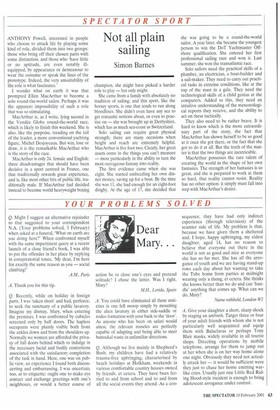Not all plain sailing
Simon Barnes
ANTHONY Powell, interested in people who choose to attack life by playing some kind of role, divided them into two groups: those who bring off their chosen parts with some distinction, and those who 'have little or no aptitude, are even notably illequipped, by appearance or demeanour to wear the costume or speak the lines of the prototype. Indeed, the very unsuitability of the role is what fascinates.'
I wonder what on earth it was that prompted Ellen MacArthur to become a solo round-the-world sailor. Perhaps it was the apparent impossibility of such a role that was so stimulating.
MacArthur is, as I write, lying second in the Vendee Globe round-the-world race, which is likely to finish this weekend. She is also, like the porpoise, treading on the tail of the leader, a more conventional yachting figure, Michel Desjoyeaux. But win, lose or draw, it is the remarkable MacArthur who is the story of the race.
MacArthur is only 24, female and English: three disadvantages that should have been decisive in a sport centred in France, one that traditionally rewards great experience, and is, like most other bits of public life, traditionally male. If MacArthur had decided instead to become world heavyweight boxing champion, she might have picked a harder role to play — but only might.
She came from a family with absolutely no tradition of sailing; and this sport, like the horsey sports, is one that tends to run along bloodlines. She didn't even have any sea to get romantic notions about, or even to practise on — she was brought up in Derbyshire, which has as much sea-coast as Switzerland.
Solo sailing can require great physical strength; there are many occasions when height and reach are extremely helpful. MacArthur is five foot two. Clearly, her great assets come in the things you can't measure — most particularly in the ability to turn the most outrageous fantasy into reality.
The first evidence came when she was eight. She started embezzling her own dinner money. saving up for a boat. By the time she was 11, she had enough for an eight-foot dinghy. At the age of 17, she decided that she was going to be a round-the-world sailor. A year later, she became the youngest person to win the DoT Yachtmaster Offshore qualification. She entered her first professional sailing race and won it. Last summer, she won the transatlantic race.
Solo sailors need the practical skills of a plumber, an electrician, a boat-builder and a sail-maker. They need to carry out practical tasks in extreme conditions, like at the top of the mast in a gale. They need the technological skills of a child genius at the computers. Added to this, they need an intuitive understanding of the meteorological reports they receive, and the ability to act on these tactically.
They also need to be rather brave. It is hard to know which is the more extraordinary part of the story, the fact that MacArthur has shown herself to be so good at it once she got there, or the fact that she got to do it at all. But the truth of the matter is that the two things are inextricable.
MacArthur possesses the rare talent of creating the world in the shape of her own fantasies. The strength of her fantasies is so great, and she is prepared to work at them so hard, that reality cannot resist. Reality has no other option: it simply must fall into step with MacArthur's desire.


































































 Previous page
Previous page